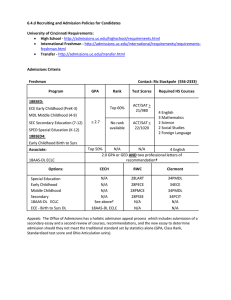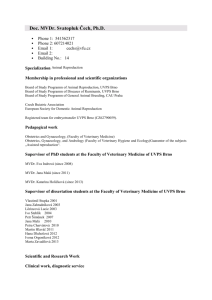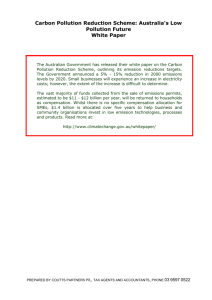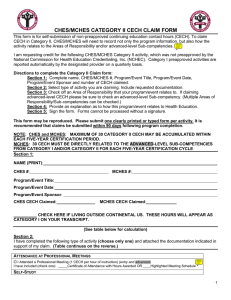Stephen Koletty, Ph - University of Southern California
advertisement
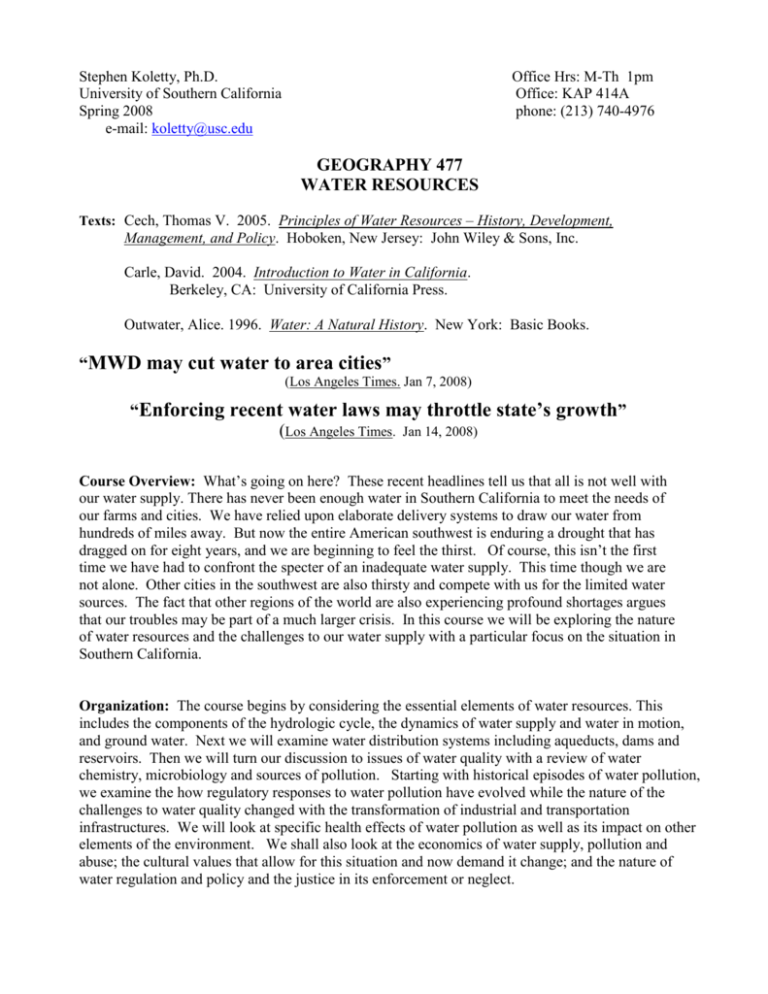
Stephen Koletty, Ph.D. University of Southern California Spring 2008 e-mail: koletty@usc.edu Office Hrs: M-Th 1pm Office: KAP 414A phone: (213) 740-4976 GEOGRAPHY 477 WATER RESOURCES Texts: Cech, Thomas V. 2005. Principles of Water Resources – History, Development, Management, and Policy. Hoboken, New Jersey: John Wiley & Sons, Inc. Carle, David. 2004. Introduction to Water in California. Berkeley, CA: University of California Press. Outwater, Alice. 1996. Water: A Natural History. New York: Basic Books. “MWD may cut water to area cities” (Los Angeles Times. Jan 7, 2008) “Enforcing recent water laws may throttle state’s growth” (Los Angeles Times. Jan 14, 2008) Course Overview: What’s going on here? These recent headlines tell us that all is not well with our water supply. There has never been enough water in Southern California to meet the needs of our farms and cities. We have relied upon elaborate delivery systems to draw our water from hundreds of miles away. But now the entire American southwest is enduring a drought that has dragged on for eight years, and we are beginning to feel the thirst. Of course, this isn’t the first time we have had to confront the specter of an inadequate water supply. This time though we are not alone. Other cities in the southwest are also thirsty and compete with us for the limited water sources. The fact that other regions of the world are also experiencing profound shortages argues that our troubles may be part of a much larger crisis. In this course we will be exploring the nature of water resources and the challenges to our water supply with a particular focus on the situation in Southern California. Organization: The course begins by considering the essential elements of water resources. This includes the components of the hydrologic cycle, the dynamics of water supply and water in motion, and ground water. Next we will examine water distribution systems including aqueducts, dams and reservoirs. Then we will turn our discussion to issues of water quality with a review of water chemistry, microbiology and sources of pollution. Starting with historical episodes of water pollution, we examine the how regulatory responses to water pollution have evolved while the nature of the challenges to water quality changed with the transformation of industrial and transportation infrastructures. We will look at specific health effects of water pollution as well as its impact on other elements of the environment. We shall also look at the economics of water supply, pollution and abuse; the cultural values that allow for this situation and now demand it change; and the nature of water regulation and policy and the justice in its enforcement or neglect. Grading: You will be graded on the basis of two topical assignments, two exams, a term project and your participation in class. You are expected to attend all class meetings and field trips. Unless prior arrangements are made with the instructor, assignments are due on the date assigned. Work handed in after that date will be marked late and marked down. Below are listed the course assignments and their weighted values. Grading: Topical Assignments (2) Participation Term Project MidTerm Exam Final Exam 20 percent 10 percent 25 percent 20 percent 25 percent Writing Assignments: The following is a general description of the writing requirements of this course. More specific guidelines will be provided. 1. Topical Assignments As we progress through the course, there will be two short assignments. One will be designed to familiarize you with the analytical tools and methodologies used to assess water supply issues. The other will look at the effectiveness of Clean Water Act by closely examining an impaired body of water selected from the regional 303(d) list. There is also a good possibility that one of these assignments may be substituted by a group project involving a community based water issue. 2. Term Project For your term project you will be employing a case study approach to investigate and report on some contemporary water issue of your choosing. The final product will be a research paper (10-14 pages) with quantitative as well as qualitative components. You will be expected to employ concepts discussed in this course and to cite other academic sources. The final paper is due on Tuesday, April 22. Part of your grade includes a 5 to 10 minute presentation to be scheduled toward the end of the semester. Before you begin I want to know what you are planning. Prepare a brief statement (200 words) describing the issue you have selected, the reasons why you have chosen it, and the situation you have selected for your case study. This statement is due Thursday, February 14. Schedule of Topics and Readings: This is a preliminary reading list. Additional materials appropriate to the specific topics will be identified as the semester progresses. We live in exciting times, and I am always looking for new material. I will be pleased to consider any supplementary reading that you think will enhance the course. Week 1: January 15, 17 Introductions/ Course Overview Outwater Water--Introduction Cech Water Resources—chapter 1 Carle Water in California--Introduction Part 1: Essential Elements of Water Week 2: January 22, 24 The Hydrosphere and the hydrologic cycle Cech Water Resources—chapter 2 Carle Water in California—Tapping into a Planetary Cycle Week 3: January 29, 31 Watersheds and the dynamics of surface waters Cech Water Resources—chapter 3 Carle Water in California—California Water Landscape Outwater Water—chapters 1thru 6 Video: Running Water I & II Week 4: February 5, 7 Groundwaters Cech Water Resources—chapter 4 Part 2: Water Distribution Systems Week 5: February 12, 14 Distribution Systems Cech Water Resources—chapter 6 Carle Water in California—The Distribution System Outwater Water—chapter 8 Due February 14: Term project statement Week 6: February 19, 21 Dams and Reservoirs Cech Water Resources—chapter 7 Outwater Water—chapter 7 Part 3: Water Pollution, Wastewater Treatment Week 7: February 26, 28 Water Chemistry and Microbiology Cech Water Resources—chapter5 Carle Water in California—Challenges to California Water Management Week 8: March 4, 6 Historical perspectives on water pollution Sources of water pollution Cech Water Resources—chapter11 Outwater Water—chapters 9, 10, 11 March 6 MidTerm Exam Part 4: Water Legislation, Regulation and Management Week 9: March 11, 13 Water law Cech Water Resources—chapter8 Week 10: March 18, 20 Spring Recess Week 11: March 25, 27 Federal Water Management agencies Cech Water Resources—chapter9 Week 12: April 1, 3 Local and Regional Water Management Cech Water Resources—chapter 10 Week 13: April 8, 10 The national effort to control water pollution Clean Water Act, Safe Drinking Water Act Regulating water quality in California Part 5: Water Issues Week 14: April 15, 17 Economics of Water Use and Misuse Cech Water Resources—chapter 13 Week 15: April 22, 24 Water Use Conflicts Cech Water Resources—chapter 14 Carle Water in California—Meeting the Challenges Due April 22: Term Project Week 16: April 29, May 1 Emerging Water Issues Cech Water Resources—chapter 15 Course Summary and Review May 8 FINAL EXAM (2pm Thursday)

